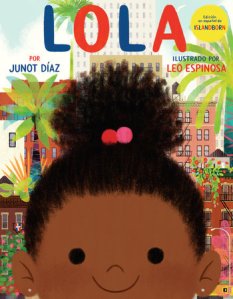Written by Kiran Gokal
Junot Diaz, the Dominican-American author of renowned books This Is How You Lose Her and The Brief Wondrous Life of Oscar Wao, recently released a children’s book called Islandborn which focuses on six-year-old Lola, an Afro-Caribbean girl who came over to the United States so young that she has no memories of the island where she was born. At the Texas Library Association this past Thursday, Diaz spoke about his children’s book and not only his own connection to it, but the importance of it within the children’s book industry. The narrative of the novel follows Lola and her fellow classmates, all children who are from somewhere else, as they’re asked to draw a picture of their “first country.” Lola, not recalling any memories of her own, must reconstruct hers by drawing on those of her relatives to remind herself of and to illustrate her home country.
 Diaz is most well-known for writing novels that chronicle different Dominican-American experiences in many settings, contemporary and historical—experiences that are not represented often in the children’s book industry. Like Lola, Diaz immigrated to the United States when he was just six years old. Diaz recalls coming upon the idea for this book when he realized that “the narrative of innocence that hangs over a lot of children’s books was insufficient to address the kind of childhood [he] had.” There isn’t much representation in the children’s book industry for minorities and people of color and further, a perpetuated idea exists that children must be protected from the “uglier parts of life.” Lola includes narratives that highlight the wonderful aspects of her home country but also the “uglier” parts, such as a “monster” that invades the Island and rules it for thirty years before being banished by heroes—an allegory for, but not limited to, the dictatorship of Rafael Trujillo over generations of Dominicans.
Diaz is most well-known for writing novels that chronicle different Dominican-American experiences in many settings, contemporary and historical—experiences that are not represented often in the children’s book industry. Like Lola, Diaz immigrated to the United States when he was just six years old. Diaz recalls coming upon the idea for this book when he realized that “the narrative of innocence that hangs over a lot of children’s books was insufficient to address the kind of childhood [he] had.” There isn’t much representation in the children’s book industry for minorities and people of color and further, a perpetuated idea exists that children must be protected from the “uglier parts of life.” Lola includes narratives that highlight the wonderful aspects of her home country but also the “uglier” parts, such as a “monster” that invades the Island and rules it for thirty years before being banished by heroes—an allegory for, but not limited to, the dictatorship of Rafael Trujillo over generations of Dominicans.
Diaz further pointed out in his keynote speech that 94% of all children’s books are written by white authors. When compared to the amount of children of color (over 50%) being born in this country, it creates what he coins a “representational famine.” For an industry that profits off influencing the young of our country, the lack of representation is not only dangerous but extremely othering. People of color only account for 22% of children’s books and even inanimate objects such as trains and trucks are afforded more representation. With this book, Diaz hopes to “change the landscape of books children are offered in school and at home.” He emphasizes that if children of color can, and are made to, read about white characters in children’s books, then the reverse must also happen: “the white default is, in some ways, the cornerstone of white supremacy. It’s not some innocent issue.”
Lola by Junot Diaz is out right now. Please read it, share it, and buy it for your siblings, your nieces and nephews. Though the book is one that will resonate deeply with immigrant readers, Diaz has said he hopes that won’t be the only audience for his book.
“The best stories provide us with opportunities for recognition and estrangement—to be spoken to most directly, or to feel that we are eavesdropping.”
